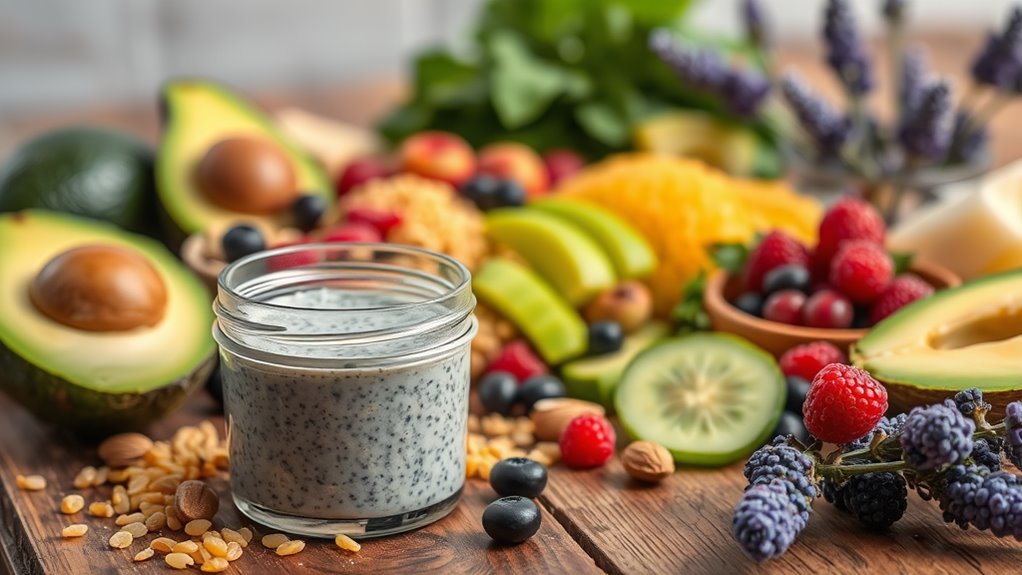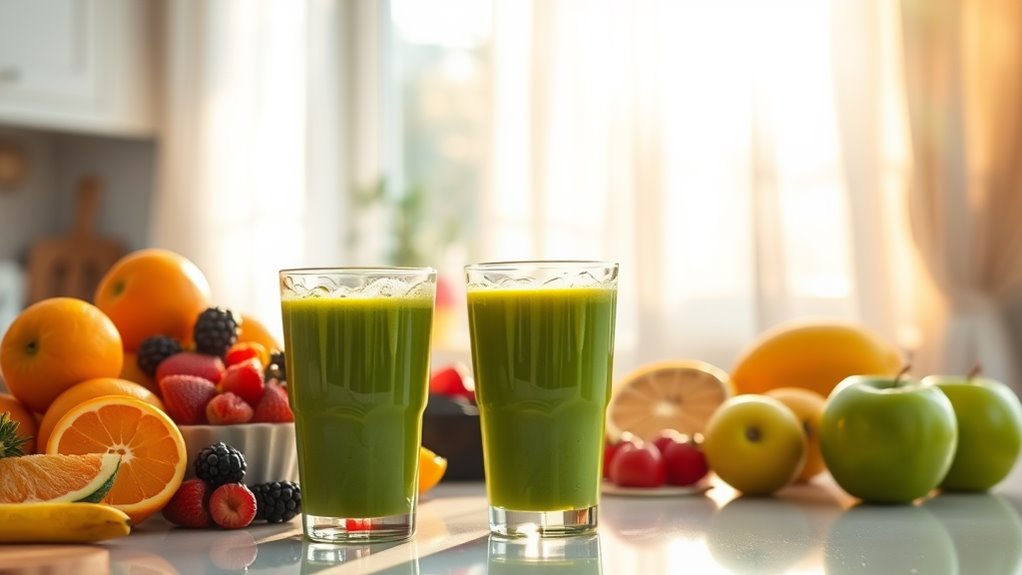This Calming Self-Care Ritual Is Pure Bliss
Engaging in a calming self-care ritual can truly be pure bliss. Start by setting a soothing atmosphere with soft lighting and your favorite scents to create a serene space. Incorporate mindful breathing to ease stress, and add gentle movements like yoga or walking to nurture your body. Don’t forget to nourish yourself with whole foods and stay hydrated. This beautiful practice enhances your well-being and deepens your connection with yourself, and there’s so much more to discover.
Key Takeaways
- Create a soothing atmosphere with soft lighting and calming scents to enhance your self-care experience.
- Incorporate mindful breathing to release stress and promote clarity during your rituals.
- Engage in gentle movements like yoga or walking to nurture both body and mind.
- Experiment with creative activities such as painting or writing to express emotions and ignite joy.
- Nourish your body with whole foods and practice mindful eating to support overall well-being.
The Importance of Self-Care
When you take a moment to prioritize self-care, you’re not just indulging in luxury; you’re investing in your well-being. Self-care isn’t a selfish act; it’s essential for maintaining your mental and emotional health.
Think about incorporating relaxation ideas at home, like curling up with a good book, enjoying a warm bath, or practicing mindfulness through meditation. These simple practices can help you recharge and find balance amidst life’s chaos. Engaging in intentional practices can lead to a more profound sense of holistic well-being and overall tranquility.
Remember, taking time for yourself doesn’t mean you’re neglecting responsibilities; it means you’re equipping yourself to handle them better. By nurturing your own needs, you’ll create a more resilient, fulfilled version of yourself.
Setting the Perfect Atmosphere
Creating the right atmosphere can transform your self-care rituals into truly restorative experiences. By focusing on lighting, incorporating soothing scents, and arranging comfortable seating, you can cultivate a space that invites relaxation and rejuvenation. Let’s explore how these elements can come together to enhance your self-care journey. Additionally, incorporating calming aroma blends can significantly enhance your mood and promote a sense of tranquility.
Lighting and Ambiance
Although it might seem minor, the right lighting and ambiance can transform your self-care ritual into a truly rejuvenating experience.
Soft, warm lighting creates a sense of calm, helping you to unwind and focus on your needs. Consider dimming the lights or using candles to set a soothing atmosphere that invites relaxation.
You might also want to experiment with string lights or lamps that emit a gentle glow, enhancing the feeling of coziness.
Incorporating natural elements, like a fireplace or even a sun-drenched window, can elevate the mood.
Aromatherapy Essentials
Essential to any self-care routine, aromatherapy can elevate your atmosphere and enhance your overall experience.
The right scents can soothe your mind and body, creating a sanctuary for relaxation. Here are four essential oils to consider:
-
Lavender – Known for its calming properties, it helps reduce stress and promote sleep.
-
Peppermint – Energizing and invigorating, it can boost your mood and enhance focus.
-
Eucalyptus – Refreshing and cleansing, it’s great for clearing the mind and easing tension.
-
Chamomile – Gentle and soothing, it’s perfect for winding down and alleviating anxiety.
Incorporating these fragrances into your self-care ritual can transform your space into a peaceful retreat, allowing you to unwind and recharge.
Comfortable Seating Arrangement
A cozy seating arrangement can make all the difference in setting the perfect atmosphere for your self-care rituals.
Think about where you feel most relaxed—whether it’s a plush armchair or a soft floor cushion. Surround yourself with pillows and throws that invite comfort and warmth.
The right lighting is crucial too; consider soft, ambient lights or candles to create a serene environment. As you settle in, take a moment to breathe deeply and let go of the day’s stress.
This space is yours, a sanctuary for rejuvenation. By prioritizing comfort, you’re telling yourself that you deserve this time to unwind and recharge.
Choosing Your Favorite Scents
Choosing your favorite scents can transform your self-care routine into a truly personal experience. Don’t hesitate to experiment with different blends, and let the seasons guide your selections to evoke the right mood. Creating an essential oil room spray can enhance your atmosphere and promote relaxation, making it a must-have for any home.
Personal Preferences Matter
While exploring self-care rituals, it’s important to recognize that personal preferences play a significant role in the scents you choose.
Selecting fragrances that resonate with you can elevate your experience and create a calming atmosphere. Here are four aspects to consider when picking your favorite scents:
-
Nostalgia: Think about scents that remind you of happy memories or comforting moments.
-
Mood Enhancement: Choose fragrances that uplift your spirits or help you relax, based on your current needs.
-
Seasonal Favorites: Embrace scents that align with the seasons, like fresh florals in spring or warm spices in winter.
-
Natural vs. Synthetic: Decide if you prefer essential oils or synthetic fragrances, as this can impact your overall enjoyment.
Trust your instincts and let your preferences guide you.
Experiment With Blends
Finding the perfect scent can be a deeply personal journey, and one of the most enjoyable ways to enhance your self-care rituals is by experimenting with blends.
Start by choosing a few essential oils or fragrance notes that resonate with you—think calming lavender, invigorating citrus, or grounding sandalwood. Mix them in small amounts to create unique combinations that reflect your mood and intentions.
Trust your instincts; there’s no right or wrong way to blend. You might discover that a hint of vanilla softens the sharpness of eucalyptus, or that a splash of peppermint energizes your favorite floral scent.
Allow your senses to guide you, and remember, each blend can bring a new layer of tranquility and joy to your self-care routine.
Seasonal Scent Selections
As the seasons change, so do the scents that can elevate your self-care rituals, inviting you to embrace different moods and feelings.
Choosing the right seasonal scent can enhance your experience and bring a sense of peace and comfort. Here are some selections to consider:
-
Spring: Fresh florals like lavender or cherry blossom to awaken your senses.
-
Summer: Citrus notes, such as lemon or grapefruit, to energize and uplift your spirit.
-
Autumn: Warm spices like cinnamon or clove to create a cozy, comforting atmosphere.
-
Winter: Earthy scents like pine or cedarwood to ground you during the colder months.
Experiment with these scents to discover what resonates with you and enhances your self-care journey.
Embrace the transformation!
Incorporating Mindful Breathing
Incorporating mindful breathing into your daily routine can transform how you experience stress and anxiety. It’s about taking a moment to pause, reconnect, and ground yourself.
Start by finding a quiet space. Close your eyes and take a deep breath in through your nose, allowing your belly to expand. Hold that breath for a moment, then exhale slowly through your mouth.
This simple practice can help you regain clarity and calm your racing thoughts. As you breathe mindfully, focus on the rhythm of your breath, letting go of distractions. Even just a few minutes can bring a sense of peace. Additionally, engaging in calming self-care rituals can enhance your overall well-being and promote tranquility.
Engaging in Gentle Movement
Gentle movement can be a powerful way to nurture your body and mind.
Whether it’s a leisurely walk, gentle yoga, or simple stretches, incorporating these activities into your routine can bring a sense of calm and joy.
Let’s explore how you can make gentle movement a fulfilling part of your self-care rituals.
Benefits of Gentle Movement
When you embrace gentle movement, you’re not just engaging your body; you’re nurturing your mind and spirit as well. This practice offers a wealth of benefits that can enhance your overall well-being.
Here are some key advantages:
-
Reduces Stress: Gentle movement can lower cortisol levels, helping to alleviate anxiety and promote relaxation.
-
Improves Flexibility: Regular gentle activities help increase your range of motion, making daily tasks easier and more enjoyable.
-
Enhances Mindfulness: Focusing on your body and breath during gentle movement encourages a deeper connection with the present moment.
-
Boosts Mood: Engaging in gentle movement releases endorphins, leading to a natural uplift in your mood and overall sense of happiness.
Incorporating these practices into your routine can create a profound sense of balance in your life.
Types of Gentle Activities
Finding joy in movement doesn’t have to mean high-intensity workouts; there are plenty of gentle activities that can soothe both body and mind. Engaging in these gentle movements can help you reconnect with yourself and promote a sense of calm. Here are some wonderful options to explore:
| Activity | Benefits |
|---|---|
| Yoga | Enhances flexibility and reduces stress |
| Tai Chi | Improves balance and promotes relaxation |
| Walking | Boosts mood and improves circulation |
| Stretching | Relieves tension and increases mobility |
| Gentle Swimming | Provides low-impact exercise and soothes the body |
Choose what resonates with you and invite these gentle practices into your routine. They’re not just exercises; they’re opportunities for self-discovery and tranquility.
Incorporating Movement Into Routine
Incorporating movement into your daily routine can feel daunting, but it doesn’t have to be.
Gentle movement can enhance your well-being and bring a sense of calm to your day. Start small and gradually integrate these activities:
-
Morning Stretch: Begin your day with a few gentle stretches to awaken your body and mind.
-
Mindful Walking: Take a short walk outside, focusing on your breath and the sensations around you.
-
Chair Yoga: If you’re at a desk, try simple chair yoga poses to release tension and improve posture.
-
Dance Break: Put on your favorite song and dance for a few minutes—it’s fun and uplifting!
Exploring Creative Expression
Although life can often feel overwhelming, exploring creative expression offers a powerful outlet for your emotions and thoughts.
Whether it’s painting, writing, or playing music, engaging in creative activities can help you process feelings and find solace. You don’t need to be an expert; the act of creating is what matters.
Allow yourself to experiment without judgment, discovering what resonates with you. This process can ignite joy and foster self-discovery, serving as a reminder of your unique perspective.
Embrace the freedom that comes with creativity, letting it become a ritual in your self-care routine. By tapping into your creative side, you’ll not only relieve stress but also cultivate a deeper connection with yourself.
Nourishing Your Body
When you prioritize nourishing your body, you’re making a profound commitment to your overall well-being.
This self-care ritual goes beyond just eating; it’s about fueling your body with love and intention.
Here are four ways to embrace this nourishment:
-
Whole Foods: Choose fruits, vegetables, whole grains, and lean proteins to provide essential nutrients.
-
Hydration: Drink plenty of water throughout the day to keep your body functioning optimally.
-
Mindful Eating: Slow down and savor each bite, allowing yourself to enjoy the flavors and textures of your food.
-
Balanced Meals: Aim for a mix of macronutrients—carbs, proteins, and fats—to keep your energy levels steady.
Disconnecting From Technology
Nourishing your body is just one piece of the self-care puzzle; equally important is how you connect with the world around you. Disconnecting from technology, even for a short while, can be transformative.
It allows you to step back from constant notifications and the digital noise that can overwhelm your mind. Try setting aside specific times to unplug—this can help you regain focus and create space for reflection.
Use this time to engage in activities that ground you, like reading, walking, or simply enjoying nature. Notice how your thoughts become clearer and your stress diminishes.
You’ll find that embracing silence and solitude can lead to deeper connections with yourself and those around you, fostering a sense of peace and clarity.
Cultivating Gratitude
How often do you take a moment to reflect on the things you’re grateful for?
Cultivating gratitude can transform your mindset and enhance your overall well-being. It’s about recognizing the positives in your life, no matter how small.
Here are some simple ways to practice gratitude:
- Keep a Gratitude Journal: Write down three things you appreciate each day.
- Share with Others: Tell a friend or family member what you’re thankful for about them.
- Mindfulness Meditation: Spend time focusing on your breath and the blessings around you.
- Create a Gratitude Jar: Fill it with notes of appreciation, revisiting them whenever you need a boost.
Embrace these practices, and watch how they enrich your life.
You deserve this joy!
Establishing a Consistent Routine
Establishing a consistent routine can significantly improve your mental and emotional well-being, especially when life feels chaotic. Routines provide a sense of stability and predictability, grounding you amidst uncertainty. To create a routine that works for you, focus on incorporating activities that nourish your mind and body.
| Morning Activities | Evening Activities |
|---|---|
| Meditation or Journaling | Reading or Relaxation |
| Light Exercise | Herbal Tea and Reflection |
| Healthy Breakfast | Gratitude Practice |




